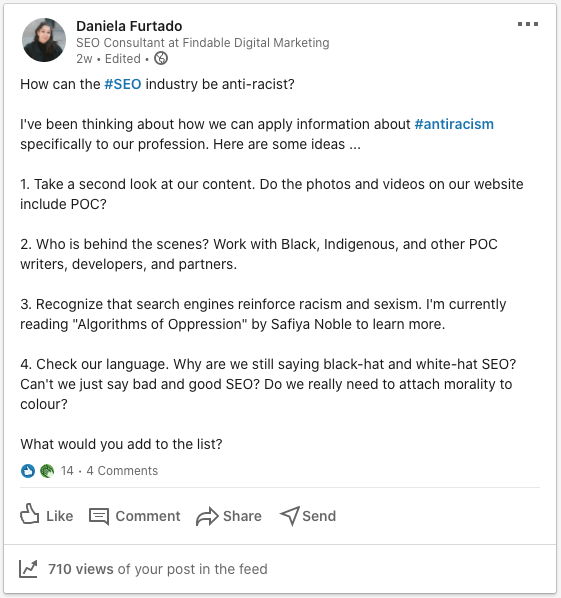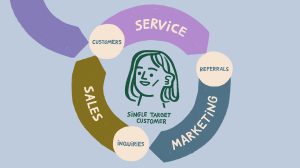Written by Daniela Furtado
We crowdsourced ideas on how the SEO industry be anti-racist and anti-sexist.
Lately, there have been plenty of resources for businesses to integrate diversity, equity, and inclusion in their hiring and management practices.
But what can we do as SEO professionals?
How can we apply the information about anti-racism and anti-sexism specifically to our industry and professions? What can we do as freelancers, employees, managers, and agency owners?
After researching and brainstorming some ideas, I took to social media to crowdsource some more.
Since most social media posts live for only 48 hours, I’m sharing all the ideas I’ve received here to give them a more permanent home.

I’m by no means an expert.
Like you, I’m learning. By all means, I’m open to your suggestions and feedback. Throughout this article, I’ve included links to resources that have helped me learn but to also give you more context.
1. Take a Second Look at Our Teams
Our industry is hella male and pale.
An estimated 70% of SEO professionals are male and people of colour are a minority in the technology and marketing industries.
What’s it like in your company?
Who are your employees? Who are your freelancers and contractors? Who are your podcast interviewees, guest blog writers or event speakers?
If the people around us are predominantly white and male, we need to take a closer look at our management practices. Ask yourself, how we can do a better job of attracting and welcoming diversity?
Here are some resources …
- “Dear White Boss…” by Keith A. Caver and Ancella B. Livers of Harvard Business Review
- “Black Americans in The Workplace” by The Daily Show with Trevor Noah
- “Five Years of Tech Diversity Reports—and Little Progress” by Sara Harrison of Wired
- “Why are Black and Latino people still kept out of the tech industry?” by Sam Dean and Johana Bhuiyan of Los Angeles Times
- “7 Things You Can Do to Recruit Women of Color” by Catalyst
2. Understand How Technology Reinforces Oppression
Technology is not neutral.
As internet marketers and developers, we are moving our biases from offline to online.
We’ve encoded racism and sexism in our everyday algorithms and technologies.
It’s important we first understand how we built oppression into our technology so that we can work together to detangle it, but also create policies and systems to avoid it in the future.
Start with reading Algorithms of Oppression by Safiya Nobles.
Here are some resources …
- “Algorithms of Oppression: How Search Engines Reinforce Racism” by Safiya Nobles
- “Of course, technology perpetuates racism. It was designed that way.” by Charlton McIlwainarchive of MIT Technology Review
- “How white engineers built racist code – and why it’s dangerous for black people” by Ali Breland of The Guardian
- “Marketing & Technology Data Is Racist & Biased: Here’s How Marketers Can Fix It” by Carolyn Lyden of Search Engine Journal
3. Add Diversity to Our Website Audits
Every SEO project starts with a website audit. While we check a website’s technical SEO posture, use of keywords and overall user experience, let’s also check for diversity and inclusion.
Whether you’re auditing your own website or a client’s, take a close look at the language being used. Do you see anything that is offensive or inappropriate?
When it comes to photos and videos, study the models. Is there a good mix of genders and ethnicities? Are women, Black or Indigenous people posing for leadership roles?
If the company brags about being international or diverse but the language or multimedia on their website doesn’t represent that, we’re in a great position to advise them. The people on their website should represent the people that work in the organization.
Now, if they have a diverse mix of models in their photos but that same diversity doesn’t exist in the company, that’s misleading. Instead, they need to work on point 1.
Here are some resources …
- “How to Use & Promote Inclusive Language at Your Organization” by Caroline Forsey of Hubspot
- “Where To Find Free Stock Photos With People of Color” by Camille Eddy of People of Color in Tech
4. Watch Our Language
Some of the terminologies in SEO and technology have racist undertones.
Companies like Github, Django, Drupal and Clockwork have publicly announced that they’ve created policies to use inclusive language.
Here are some ways we can do the same:
- Replace “Master and Slave” with “Primary and Replica”
- Replace “Webmaster” with “Web Leader”
- Replace “White and Black Hat” with “Ethical and Unethical”
- Replace “Whitelist and Blacklist” with “Allow and Deny List”
This has been an online conversation since 2003 and there’ve been ongoing debates about it on Reddit and Twitter.
After having a handful of tough conversations with colleagues, my personal opinion is this:
It’s a simple and almost effortless change we can make, but at the end of the day, it’s not going to fix structural racism. Whether you choose to say black hat SEO or not, governments are still enforcing racism and some people are still dying from it. Our time and energy are better spent on making changes that are really going to move the needle.
Here are some more resources …
- “Github is replacing the word master to avoid slavery references. Deal with it.” by Rocky Kev of Dev
- “Do all white folks think the same? We turned this video off…” by Aba and Preach
5. Volunteer Our Time and Skills to Non-Profits
Professional SEO help doesn’t come cheap.
If you have the time to spare, reach out to local non-profits that are leading the fight against sexism and racism in their communities.
Our help could be as simple as a website audit, keyword research or training their marketing team on SEO best practices.
Ask them what they need and if they don’t know much about SEO, offer some suggestions.
Here are some more resources …
6. Keep Our Suppliers Accountable
We can vote with our dollars, euros, yen or pesos.
As paying customers, we have a lot of power over how our suppliers run their businesses. If we want to see companies like Google Ads, HubSpot, Moz, SEMRush and Ahrefs take diversity seriously, we need to hold them accountable.
Reach out and ask them what their anti-racism and anti-sexism policies and efforts are. The more you pay for their services, the more they’ll listen to you.
Here are some more resources …
- “Template For Holding Your Employer Accountable For Racial Justice” by Rachel Cargle
7. Put Together a Diversity Advisory Committee
Whether you’re a freelancer or a company of +100, putting together an advisory committee can help you point out your blind spots when it comes to diversity and inclusion.
These are professionals that are educated on DEI issues and practices.
These are the people that are going to tell you “you’re doing it wrong” before it’s too late.
Here are some more resources …
- “How to Develop a Diversity and Inclusion Initiative” by Society for Human Resources Management
- “13 Ways Business Owners Can Encourage Gender Equality Through Company Culture” by Forbes
- “Diversity and Inclusion Efforts That Really Work” by David Pedulla of Harvard Business Review
8. Lobby Our Local Governments
Change needs to come from the top just as much as it needs from the bottom.
In some countries, adding a photo to your CV and asking personal interview questions are common practices (I’m looking at you Portugal, Spain and Italy).
We can petition, protest and lobby out local governments to make policies or pass laws that will make companies take race and gender diversity seriously.
Research business associations, councils and chambers in your community to see how you can get involved.
Here are some more resources …
Daniela Furtado
Daniela Furtado is a consultant, writer and speaker on how to make businesses easy to find online. She is the founder and CEO of Findable Digital Marketing. Off the clock, she enjoys cooking, dancing, and drawing. She is based in Toronto, Canada.
 What is Cross-Cultural Marketing?
What is Cross-Cultural Marketing? 5 Examples of Cross-Cultural Marketing We Love
5 Examples of Cross-Cultural Marketing We Love

